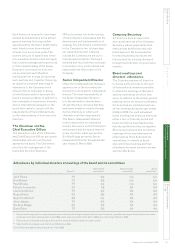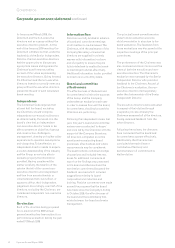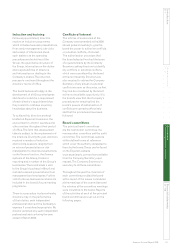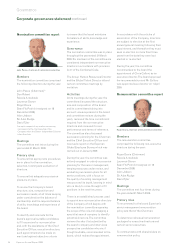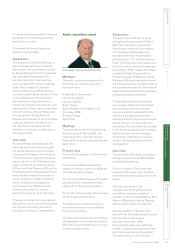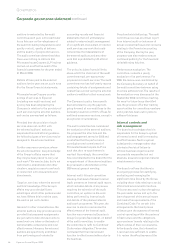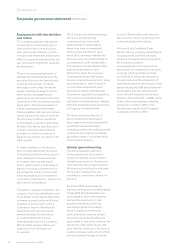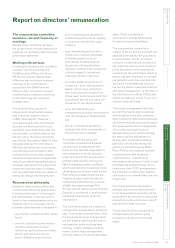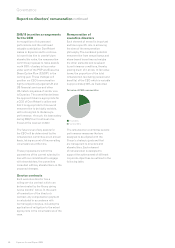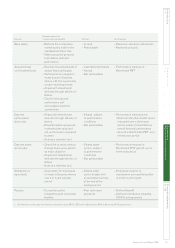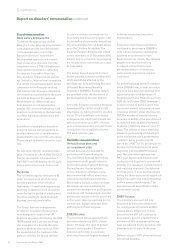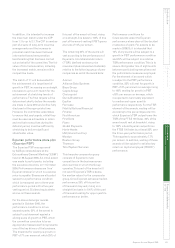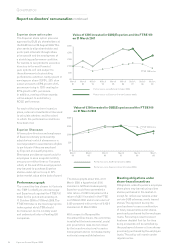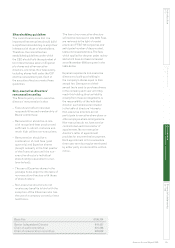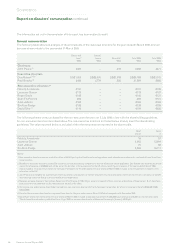Experian 2009 Annual Report Download - page 58
Download and view the complete annual report
Please find page 58 of the 2009 Experian annual report below. You can navigate through the pages in the report by either clicking on the pages listed below, or by using the keyword search tool below to find specific information within the annual report.
56 Experian Annual Report 2009
Governance
Corporate governance statement continued
Fraud and whistleblowing:
The audit
committee receives an annual report
from internal audit on instances of
actual or potential fraud, and concerns
relating to the nancial accounting
of the Company. During the year,
progress was also made to ensure
continued publicity for the fraud and
whistleblowing helpline.
Performance evaluation:
The
committee conducts a yearly
evaluation of its performance. For
2008, the review was coordinated by
the Company Secretary on behalf of
the audit committee chairman using
an online software tool. The results of
the evaluation were discussed at the
September 2008 committee meeting.
An area for future focus identied
was the provision of further training
opportunities for committee members
and a plan has been put in place to
address this issue.
Internal controls and
risk management
The board acknowledges that it is
responsible for the Group’s system
of internal control and for reviewing
its effectiveness. Such a system
is designed to manage rather than
eliminate the risk of failure to
achieve business objectives and
can provide reasonable, but not
absolute, assurance against material
misstatement or loss.
The board conrms that there is
an ongoing process for identifying,
evaluating and managing the
signicant risks faced by the Group,
including those risks relating to social,
ethical and environmental matters.
This process was in place throughout
the year under review and up to the
date of approval of the annual report
and meets the requirements of the
Combined Code. For certain joint
arrangements, the board places
reliance upon the systems of internal
control operating within the partners’
infrastructure and the obligations
upon partners’ boards relating to the
effectiveness of their own systems.
In the board’s view, the information
it received was sufcient to enable
it to review the effectiveness of the
accounting records and nancial
statements that will ultimately be
subject to external audit; management
of or signicant involvement in internal
audit services; any work that could
compromise the independence of
the external auditors; and any other
work that is prohibited by UK ethical
guidance.
The policy includes nancial limits
above which the chairman of the audit
committee must pre-approve any
proposed non-audit services. The audit
committee receives half-yearly reports
containing details of assignments and
related fees carried out by the external
auditors in addition to their normal work.
The Company’s policy has recently
been amended to cap the payment,
going forward, of non-audit fees to the
Company’s auditors at 100% of fees for
audit and assurance services, except in
exceptional circumstances.
The audit committee has considered
the evaluation of the external auditors,
the proposed fee structure and the
audit engagement terms for 2009 and
is satised that the performance,
contribution and commitment of
PricewaterhouseCoopers LLP are
such that their re-appointment is
merited. Accordingly, the committee
has recommended to the board that the
re-appointment of the external auditors
be proposed to shareholders at the
2009 annual general meeting.
Internal audit:
At each committee
meeting, the Head of Global Internal
Audit presents an internal audit report,
which includes details of any issues
requiring the attention of the audit
committee, an update on the work
being performed by internal audit
and details of the planned internal
audit work programme. This year, the
exercise to monitor and review the
effectiveness of the internal audit
function was overseen by Experian’s
Group Corporate Secretariat, on behalf
of the audit committee, to enable
the committee to full its Combined
Code review obligation. The review
concluded that the internal audit
function is effective and adds value to
the business.
auditors is evaluated by the audit
committee each year, with a particular
focus this year on the robustness of
the audit (including independence and
quality control), quality of delivery
and the quality of people and service.
The audit committee determined that
there was nothing to indicate that
PricewaterhouseCoopers LLP had not
carried out an effective audit of the
nancial statements for the year ended
31 March 2008.
Details of fees paid to the external
auditors for the year are set out in note
6 to the Group nancial statements.
PricewaterhouseCoopers provide
a range of services to Experian
(including non-audit services) and
a policy has been adopted by the
Company in relation to the provision of
such services by the external auditors
and can be summarised as follows.
Provided that the provision of such
services does not conict with
the external auditors’ statutory
responsibilities and ethical guidance,
the following types of services may be
assigned to the external auditors:
Further assurance services:
where
the external auditors’ deep knowledge
of the Group’s affairs means that
they may be best placed to carry out
such work. This may include, but is not
restricted to, shareholder and other
circulars, regulatory reports and work
in connection with acquisitions and
divestments.
Taxation services:
where the external
auditors’ knowledge of the Group’s
affairs may provide signicant
advantages which other parties would
not have. Where this is not the case,
the work is put out to tender.
General:
in other circumstances, the
external auditors may provide services
provided that proposed assignments
are put out to tender and decisions to
award work are taken on the basis of
demonstrable competence and cost
effectiveness. However, the external
auditors are specically prohibited
from performing work related to







